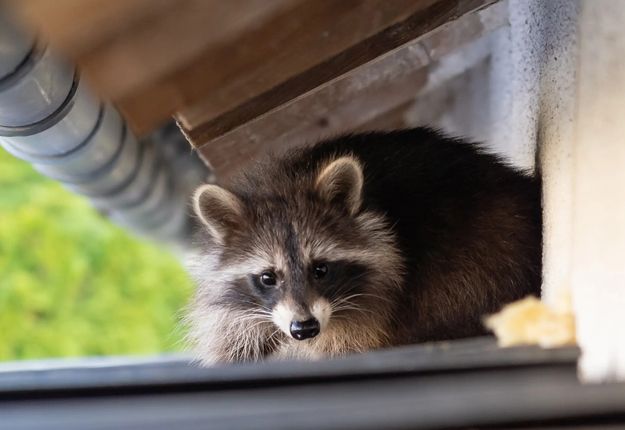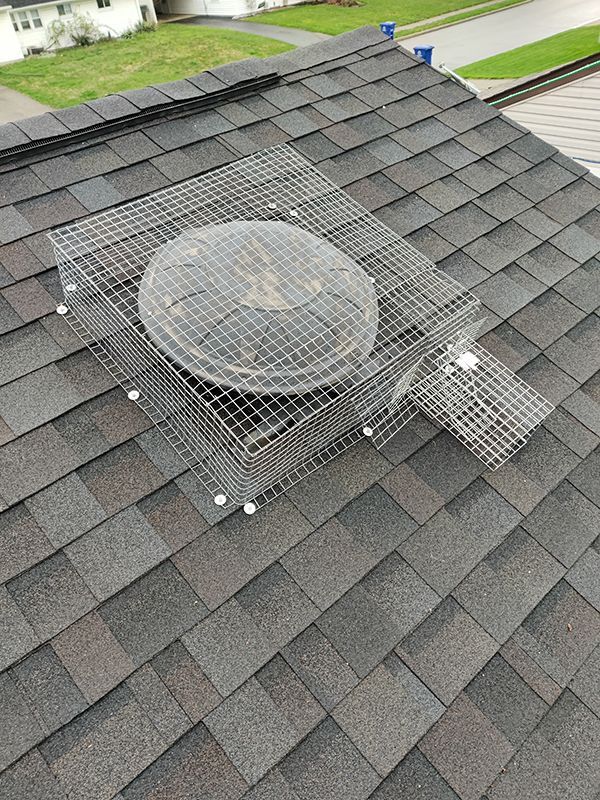Raccoon Management Services
Request a Quote
Hero Request Form
About Raccoons
Procyon Lotor (Raccoons)
Raccoons are highly adaptable and found in every county, rural, and urban location. They rely on consistent and reliable food sources like bird feeders, cat or dog food bowls, and water left out. Raccoons are also big fans of compost bins that aren't contained, unsecured garbage cans, and gardens. While it may be tempting to leave food or water out for domesticated animals, this does lead to concerns about disease transmission when raccoons and pets share the same feeding bowls.
Mating and Nesting
Raccoons may have multiple den sites. Mating season is in February and March. We usually see our first raccoon kits around the first week of March and continue to see them throughout the summer. Gestation is around 60 to 73 days. Raccoons typically have one litter per year with anywhere from 2-6 young. Kits are active and mobile for around 6 to 8 weeks and are weaned at about 7 weeks. They spend the winter with their mother learning survival and hunting skills.
Raccoons like to den in attics and access them by getting in the soffits, compromised fascia, damaged trim, roof vents, and attic vents. Raccoons may also utilize the cavities found under decks, sheds, and porches. Typically, you can see evidence of this: Paw prints may be found on downspouts as they use them to climb up and down the home. You may also see areas of digging or paw prints on trash cans and other areas near food or water sources. Raccoon damage may be caused by paths of travel and latrine areas, or by chewing or digging into insulation, wiring, and plumbing. When Raccoons invade your home or business our Raccoon Removal Services can resolve the problem quickly.
Behavior
Raccoons are generally most active from dusk to dawn; however, they do move when it is light out, which does not mean they are sick. A common misconception is that if you see a raccoon out in daylight it is ill. Most of the time, they are simply looking for a safe and warm place to nap. Often, we find them sunning themselves on flat roofs or under roof overhangs that provide shade.
A sick raccoon will exhibit symptoms, such as discharge from the eyes, nose, or mouth. Tumbling or walking in circles may be observed, as well as bare patches on their fur (which is usually a sign of distemper). Although raccoons are a rabies vector species, most ill raccoon cases in Central Ohio are a result of distemper, not rabies.
If you think you have a sick or injured raccoon, you can contact a local wildlife rehabilitation center or individual. To get more details about our raccoon eviction services, use our request a quote form or call for your inspection today.

Raccoon seeking shelter under the soffit overhang.
Raccoon Management FAQ
Have a raccoon-related question? We have the answer. Check out these FAQs and give us a call today for more information!
How Can TLC Wildlife Management Help?
TLC Wildlife Management exclusively utilizes humane techniques for the eviction of raccoons and other wildlife. We use the behavior and biology of the raccoon to allow the animal to evict without harm. Points of access commonly found are at shingle and soffit junctures, at soffits near downspouts, open un-capped chimneys, attic vents, roof vents, and ridge vents. They are also commonly found under decks, sheds, and porches.
Our humane solution starts with a one-way door placed at the point of entry, ensuring only the target animals are addressed. The Raccoons can leave on their own to feed, but cannot get back in. We then reunite any accessible offspring on the outside of the structure. As Raccoons have multiple den sites, the mother can collect her litter and move them safely to another location. TLC Wildlife Management then provides preventative solutions to prevent re-entry. This method results in less interaction with wildlife and fewer visits to your home.
We offer customized solutions that work for your home and lifestyle and all exclusion work is guaranteed.
Request a quote or call us today to schedule an evaluation that includes interior, exterior, roof, and attic inspection. We will also provide detailed photos and education about your specific situation, resulting in a solution to help you coexist in harmony with your wild neighbors!









Share On: